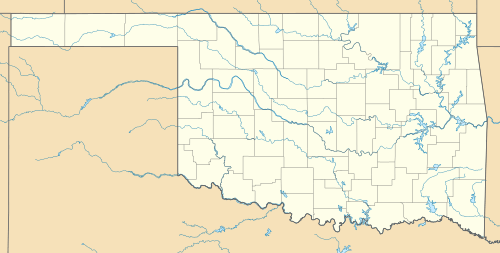Great Salt Plains State Park
| Great Salt Plains State Park | |
|---|---|
 | |
| Location | Alfalfa County, Oklahoma, United States |
| Nearest city | Jet, OK |
| Coordinates | 36°44′22″N 98°08′39″W / 36.7394740°N 98.1442330°W[1]Coordinates: 36°44′22″N 98°08′39″W / 36.7394740°N 98.1442330°W[2] |
| Area | 840 acres (340 ha) |
| Governing body | Oklahoma Tourism and Recreation Department |
| http://www.travelok.com/listings/view.profile/id.3204 | |
Great Salt Plains State Park is a 840-acre (3.4 km2) Oklahoma state park located in Alfalfa County, Oklahoma. It is located 8 miles (13 km) north of Jet, Oklahoma on SH-38 and 12 miles (19 km) east of Cherokee.[3] Recreational opportunities at Great Salt Plains State Park include boating, camping, picnicking, swimming, hiking, mountain biking and exploring. The Great Salt Plains Lake is located at the park and covers 9,300 acres (38 km2) with 41 miles (66 km) of shoreline and is a shallow, salty lake with fishing opportunities for catfish, saugeye, sandbass and hybrid striper. The average depth is reportedly 4 feet (1.2 m) and the impoundment capacity is 31,420 acre-feet. Salinity of the water in the reservoir is one-fourth that of sea water. Personal watercraft are not recommended. The park has RV and tent sites, comfort stations with showers, cabins, picnic sites, group shelters, swimming beach, playgrounds, boat ramps, fishing dock and equestrian trails. Horse rental is not available.[4]
The Great Salt Plains cover an area of 11,000 square miles (28,000 km2). It was so named because it is covered with a layer of salt deposited long ago by an inland sea. A saline aquifer still flows beneath the surface and replenishes the salt whenever the water table rises. The salt is left behind when the water evaporates. The first white men to visit this area were members of the Sibley expedition in 1811, who named it the Grand Saline.[5]
President Herbert Hoover designated an area of the Salt Fork east of Cherokee, Oklahoma as a National Wildlife Refuge on March 26, 1930. The Great Salt Plains National Wildlife Refuge sits adjacent to the park and offers great bird watching and fall foliage viewing opportunities.[4]
The refuge is the only spot in the world where crystal enthusiasts can dig for hourglass selenite, a rare and fragile form of selenite, which is a form of gypsum. Digging times are available from April 1 through October 15.[6]
See also
External links
References
- ↑ "Great Salt Plains State Park". Geographic Names Information System. United States Geological Survey. Retrieved January 6, 2013.
- ↑ "Great Salt Plains State Park". Geographic Names Information System. United States Geological Survey. Retrieved January 6, 2013.
- ↑ U,S. Army Corps of Engineers, "Welcome to Great Salt Plains Lake." Accessed July 28, 2015
- 1 2 Thomas L. Hedglen, "Great Salt Plains State Park and National Wildlife Refuge." Encyclopedia of Oklahoma History and Culture. Accessed April 19, 2013.
- ↑ Kurtis W. Boucher and Richard A. Marston, "Great Salt Plains," Encyclopedia of Oklahoma History and Culture. Accessed April 19, 2015.
- ↑ "Great Salt Plains State Park". Oklahoma Tourism and Recreation Department. Retrieved January 6, 2013.